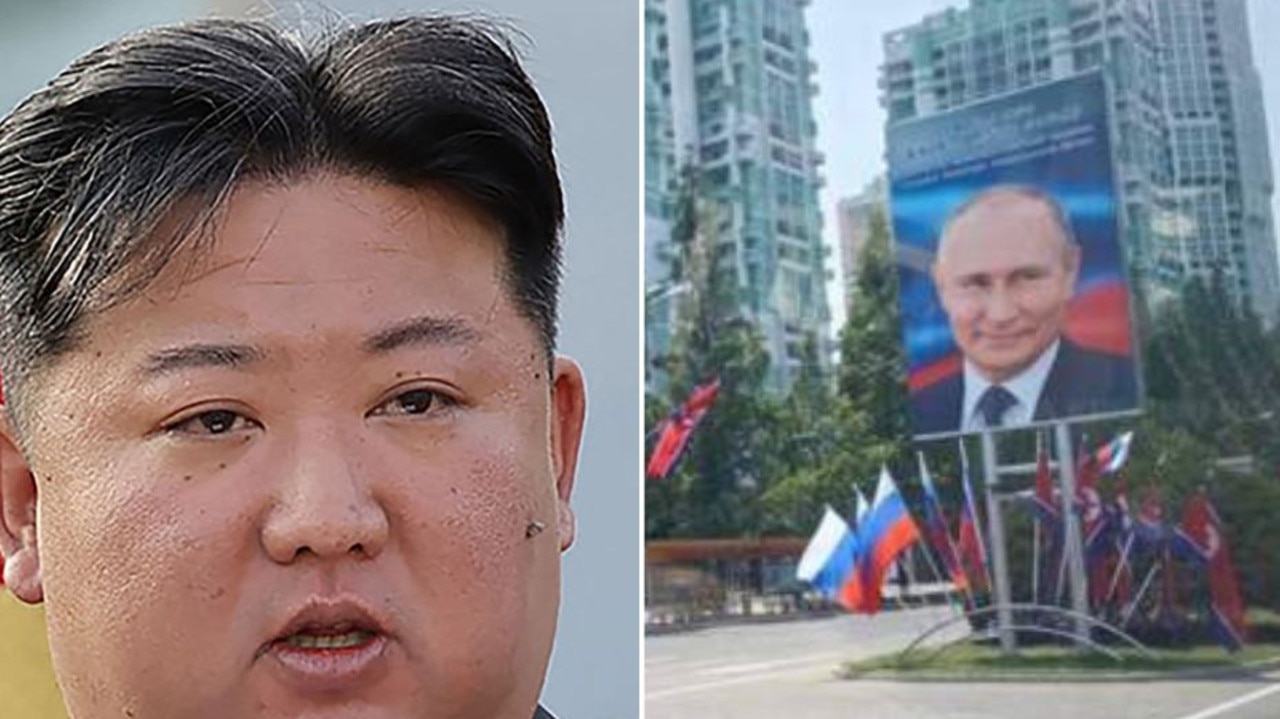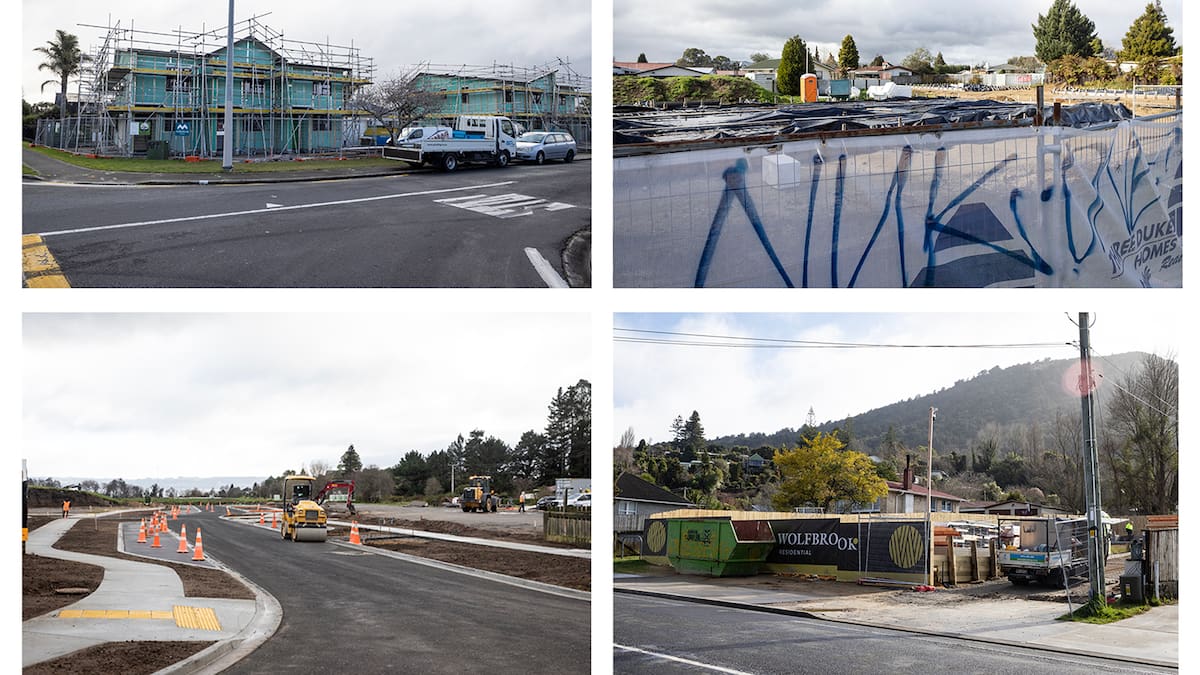Russian President Vladimir Putin’s scheduled visit to North Korea this week has raised alarm in Seoul, which has accused Pyongyang of supplying arms to Moscow for use in Ukraine.
Images posted to Telegram reveal Pyongyang has gone all-out to prepare for Putin’s arrival, which is expected on Tuesday. The city’s streets have been lined with Russian flags and portraits of the Russian leader, with a banner welcoming Putin placed along a freeway featuring numerous North Korean propaganda posters.
“The friendship between North Korea and Russia is eternal,” read one banner outside the city’s Sunan International Airport.
“We warmly welcome comrade Russian President Vladimir Vladimirovich Putin,” another said.
North Korean authorities had reportedly cleared out the runways outside the Pyongyang airport a week ago in preparation for the visit.
Putin will be greeted by an official welcome ceremony and a guard of honour before commencing talks with North Korean leader Kim Jong-un.
In a letter published in the latest edition of the Rodong Sinmun, the newspaper of North Korea’s Workers’ Party, the Russian leader said the two nations had built a strong partnership over the past seven decades. Putin took liberty in criticising the West in the letter as he pledged to build “indivisible security in Eurasia”.
“We will develop alternative mechanisms of trade and mutual settlements that are not controlled by the West, and jointly resist illegitimate unilateral restrictions,” Putin wrote.
“And at the same time – we will build an architecture of equal and indivisible security in Eurasia.”
He also thanked the nation for its ongoing support for Russia’s war in Ukraine and promised to support Pyongyang to defend its interests, which he suggested were under pressure from “US pressure, blackmail and military threats”.
Analysts say there are a number of potential reasons behind Russia strengthening ties with the hermit kingdom as it continues to wage war in Ukraine, earning widespread condemnation from Western powers.
“Strengthening ties with its old Cold War partner allows Russia to undermine the international sanctions regime, counter any suggestion that the US and its allies have been able to isolate Moscow, and also add to concerns in Washington that it may have to deal with a materially strengthened North Korea,” John Nilsson-Wright, head of the Japan and Koreas Programme at Cambridge University said via the BBC.
The diplomatic visit from one of the world’s most prominent superpowers is also a major win for the legitimacy of North Korea as a major player on the global stage. As a nation shut off from much of the world for the majority of its existence, North Korea continues to face scrutiny from the democratic West for its reported civil rights breaches and ongoing displays of military might, particularly in the form of missile launches.
US national security spokesman John Kirby said the Biden administration was wary of the strengthening ties between the two military powers, who are both openly anti-West.
“What we are concerned about is the deepening relationship between these two countries,” he said.
Tensions boil as shots fired across border
In a startling breach of the heavily fortified border, dozens of North Korean soldiers briefly crossed into South Korean territory on Tuesday, only to retreat after warning shots were fired.
This marks the second incident between the two nations in as many weeks, as Pyongyang escalates its border fortifications amid plummeting inter-Korean relations.
The South Korean Joint Chiefs of Staff (JCS) revealed that several North Korean soldiers were injured by landmine explosions near the border.
Pyongyang has recently stationed troops in the area to clear scrub and lay additional mines, amplifying tensions between the two Koreas. Despite the 1950-1953 Korean War concluding with an armistice, the two nations remain technically at war, and the Demilitarized Zone (DMZ) separating them is already one of the most heavily mined regions globally.
North Korea’s recent actions include laying more landmines, reinforcing tactical roads, and installing what appear to be antitank barriers, according to Seoul’s military.
But the JCS believes Tuesday’s incursion, similar to an incident on June 9, was accidental.
“Dozens of North Korean troops crossed the Military Demarcation Line today … (and) retreated northwards after warning shots were fired,” a JCS official stated.
The JCS further reported that North Korean soldiers engaged in reinforcing the border have suffered “multiple casualties from repeated landmine explosion incidents” but appear undeterred, continuing their operations recklessly.
“North Korea’s activities seem to be a measure to strengthen internal control, such as blocking North Korean troops and North Koreans from defecting to the South,” the JCS official noted.
‘No reconciliation’
“This has rather symbolic significance,” Koh Yu-hwan, North Korean studies emeritus professor at Dongguk University told AFP, saying adding new mines were making it clear Pyongyang did not want dialogue with the South.
“By laying mines, North Korea is demonstrating once again that, as per the instructions of the supreme leader (Kim Jong-un), there will be no reconciliation with the South,” he added.
“North Korea is not laying mines across the entire frontline, but rather in areas that are easily observable by the South. They are also blocking roads and railways that were previously areas of inter-Korean cooperation.” During a period of warmer ties in 2018, the two Koreas removed landmines along a section of the heavily fortified border in a bid to ease military tensions.
Earlier this month, around 20 North Korean soldiers crossed the military demarcation line between the two countries in a section of the border “overgrown with trees”, according to Seoul’s military, which assessed the incursion to be accidental.
That crossing came as North Korea was sending more than a thousand balloons laden with trash southward — a response, it said, to balloons carrying anti-Pyongyang propaganda sent north by activists.
The South Korean government in turn suspended a 2018 tension-reducing military deal and restarted loudspeaker propaganda broadcasts along the border, infuriating the North, which warned Seoul was creating “a new crisis”.
Ahn Chan-il, a defector-turned-researcher who runs the World Institute for North Korea Studies, told AFP that the North Korean military was trying to survey the border area to install more barriers.
“Engineering and observation units have increased their presence in the area. It is believed that the disorderly actions of those who are unfamiliar with the minefields have led to these mine-related accidents.”





